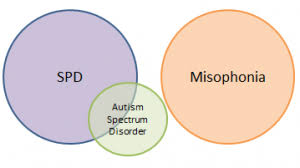Is Misophonia Linked to Autism?
 As medical science is still trying to understand misophonia and its intricate mechanisms, we’re starting to observe some interesting links between it and other, more commonly reported and “popular” conditions that medicine has been dealing with for a longer period. Autism has been frequently popping up on the radar in this context recently, and it looks like a lot of attention is currently focused on investigating a potential link between the two.
As medical science is still trying to understand misophonia and its intricate mechanisms, we’re starting to observe some interesting links between it and other, more commonly reported and “popular” conditions that medicine has been dealing with for a longer period. Autism has been frequently popping up on the radar in this context recently, and it looks like a lot of attention is currently focused on investigating a potential link between the two.
Frequency of Simultaneous Reports
One of the factors that have prompted this is an apparent increase in the frequency of cases where the two conditions are reported together. It’s indeed not rare for parents dealing with autistic children to describe them as being easily irritated by specific sounds, often to the extent that the situation provokes a physical response. However, it’s worth noting that the two are reported separately in many cases, rather than describing misophonia as just another symptom of autism, which has contributed to the perceived potential link between them.
Misophonia as a Form of Autism
This has also prompted some to investigate whether misophonia could be a subclass of autism with a milder set of symptoms. While it’s understood that autism is not a “black and white” condition – like most issues in the psychological world – the exact line where it becomes an agitated response to certain factors remains somewhat unclear. Some specialists seem convinced that the two conditions are one and the same and that misophonia is simply more specialized and tightly focused, but that remains nothing more than a hypothesis at this stage.
Ongoing Research
More research is necessary before any conclusions can be drawn. And due to the limited number of patients reporting misophonia and having the will to actually deal with it, progress has been relatively slow. To physicians, every point of contact counts and matters a lot, and the increased interest and attention towards misophonia is a good thing with regards to the future of our research into it.

Hello.
I believe my 13 year old son has Misophonia. He is Very sensitive to mouth sounds. He also cannot control his episodes. He goes into a “tic” mode which is uncontrollable.
I have been suffering from misophonia for a long time now. I hate it when my mom chews so loudly, it makes me very mad and angry when we are eating in the same room. I have to move to another room because of that though I think it makes her sad to eat alone, but I can’t help it. Later on I feel bad and scolds myself for acting selfishly. Need help real fast.
I’ve evidently had Miso since childhood. I’m 64 now but remember as much as I loved my father I could not sit next to him when we’d eat a meal. He drove me crazy and I’d fly down to my bedroom. Now Its my wife I can’t deal with.